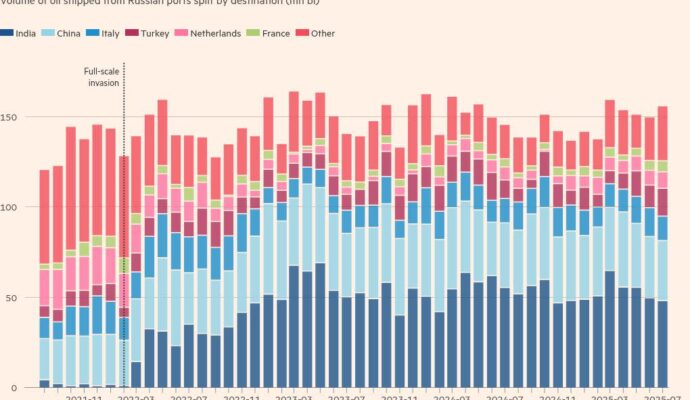Russia resumed oil exports to North Korea late last year, according to UN data, as the isolated regimes’ deepening ties drew US warnings that Pyongyang is planning to deliver more weapons to support Vladimir Putin’s war effort in Ukraine.
Data released by the UN this week showed Russia supplied 67,300 barrels of refined petroleum to North Korea between December 2022 and April 2023, the first deliveries recorded since September 2020.
North Korean dictator Kim Jong Un has assiduously curried favour with Putin since Russia’s invasion of Ukraine, with the leaders offering each other material and political aid.
In a statement marking Russia’s national day on Monday, Kim pledged his “full support” for Putin and called for “closer strategic co-operation” between their countries, according to North Korea’s state news agency.
Kim added he was “holding hands firmly with the Russian president, in conformity with the common desire of the peoples of the two countries”.
The volume of Russian transfers to North Korea constitutes a tiny proportion of its exports, which were as high as 8mn barrels a day including both crude and refined fuels before the war in Ukraine.
But the trade points to a reciprocal effort to foster closer ties between Moscow and Pyongyang, which was quick to endorse the invasion of Ukraine in February last year, and was just one of four countries other than Russia to oppose a UN General Assembly resolution condemning the war.
The US State Department expressed concern this week that North Korea was “planning to deliver more military equipment to Russia”.
It said the US had confirmed that North Korea had already completed a delivery of infantry rockets and missiles to the Kremlin-linked private military company Wagner Group.
Any purchases of weapons from North Korea would violate UN resolutions to which Russia is a signatory as a permanent member of the UN Security Council.
Following North Korea’s sixth nuclear test in 2017, the UN Security Council imposed a cap on transfers of refined oil to North Korea at 500,000 barrels a year, far below the country’s energy needs.
All transfers must be reported to a UN sanctions committee, but only a small fraction are in practice, and North Korea is known to evade the sanctions through illicit ship-to-ship transfers.
The UN data also showed that China, which has maintained a steady supply of refined oil to North Korea throughout the pandemic, delivered 35,669 barrels in January and February this year.
According to Chinese customs data, North Korean exports to China also reached the highest level in five years in April, suggesting that Pyongyang has relaxed harsh border restrictions imposed in early 2020. The oil trade from Russia to North Korea had dropped to zero in October of that year, according to the UN data.
Western diplomats worry that an increase in North Korean cross-border trade with Russia and China will further embolden Kim’s regime as it makes steady progress in developing its nuclear weapons programme.
Moscow and Beijing have repeatedly blocked US-led Security Council resolutions condemning Pyongyang’s ballistic missile programme, most recently after a failed military spy satellite launch late last month.
Additional reporting by David Sheppard in London


